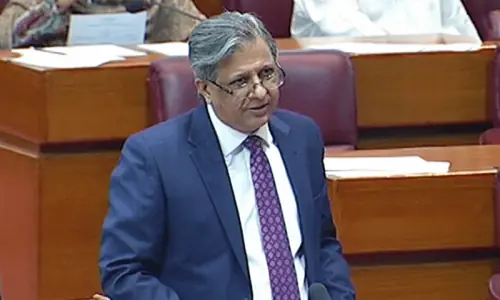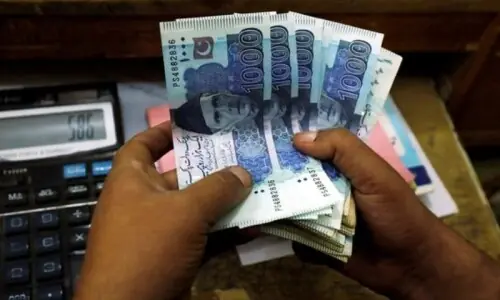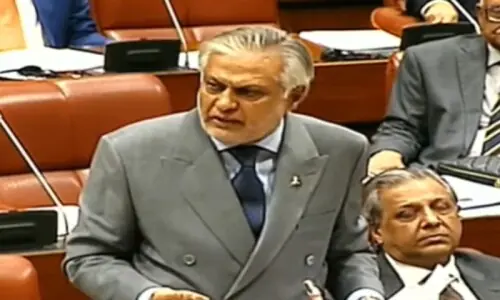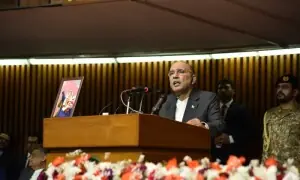THE Russian Federation’s foreign minister, Sergei Lavrov, is today one of the longest-serving foreign ministers. In addition to his long tenure in the foreign office, he has served as Russia’s permanent representative to the United Nations.
He is affable, but in a cool, distant way. The American secretary of state, Condoleezza Rice, was sharply snubbed during a trip to Moscow when she approached him in the same brash manner as she did others.
When it came to Nato’s secretary general, he was more devastating. He said he should apply for a new job because he wasn’t any good in the present one. At the Security Council, on which he represented a permanent veto-wielding member, the Russian Federation, he has been known for killing boredom by sketching and doodling.
The cartoons were good and a couple have been published in a book. Incidentally, Mountbatten’s press attaché Alan Campbell-Johnson’s book Mission with Mountbatten has a copy of Quaid-i-Azam Mohammad Ali Jinnah’s doodle, which he drew during a meeting. Campbell-Johnson retrieved it from the wastepaper basket into which the Quaid had thrown it. It adorns his book.
The truth in foreign policy is not that simple.
If Sergei Lavrov differs with his president, he is among the foreign ministers and foreign secretaries who disagreed with the prime minister or the foreign minister. On the eve of the Second World War, prime minister Neville Chamberlain kicked upstairs the permanent secretary in his foreign office, Sir Robert Vansittart, who was opposed to Chamberlain’s policy of appeasement of Hitler. He was replaced by Sir William Strong.
After the Falklands War in 1982, prime minister Margaret Thatcher shook the foreign office because, in her opinion, it had misled her. She appointed an adviser on foreign affairs in her own office, but from the foreign office.
President Harry S. Truman is said to have regarded his own State Department as a hostile foreign power. In Israel, prime minister Golda Meir “considered the diplomatic professionals to be too polished, excessively inclined to understand diverse points of view, and afflicted with analytical and intellectual habits that made communication and understanding between them difficult”.
Israeli diplomat and politician Abba Eban said: “Golda’s talent lay in the simplification of issues.” Others serving on her staff said she went straight to the heart of the problem. In contrast to her, Eban said, foreign policy experts understood the complexity of diplomatic relations and the elements that form the basis for decisions and policies. These experts, he said, “react with resignation to the idea that Israel’s vital interests are not all that vital to non-Israelis”. They are aware of the nature of the profession, in which the external situation can create internal challenges. The problem with foreign policy is that a nation’s sovereignty has less influence than in any other field of public policy.
According to Abba Eban: “Since Golda was a tough character with a domineering streak, the temptation for senior officials to adapt their advice to her prejudices was strong. While she was foreign minister, habits of consultation in the ministry were few.” Apparently, “the very word ‘analysis’ provoked her to irritability. When officials analysed the contradictory waves of influence that flowed into decision-making, she tended to interrupt them with an abrupt request for the main point”. Getting to the point, it seems, was not easy when the truth is not all that simple.
The diplomat is not blameless. He tends to live in a cocoon and breathes the rarified atmosphere of his elevated circle. He is utterly ignorant of the claims of public opinion and is indifferent to the fact that his minister owes his job to the people’s mandate. A wise foreign minister bridges the divide between his officials, the diplomats, and the parliamentarians who voice public opinion — and their ignorance of the intricacies of foreign policy.
Public opinion at home tends to overestimate the luxury, dignity and ease in which diplomats live, and to underestimate the personal risk and torment of conscience inherent in their task. In most nations, public opinion is in constant revolt against foreign policy, precisely because it is a domain in which the national will is not supreme. The constraints imposed by the international systems are blamed on the ministry, which mediates between the nation and its external realm. And, even in their home capitals, foreign ministry officials are in danger of living outside their own social reality and becoming enclosed in a special diplomatic world.
It is the duty of the politician who heads the foreign ministry, the foreign minister, to serve as a mediator between the politicians and professional diplomats.
The writer is an author and a lawyer based in Mumbai.
Published in Dawn, April 9th, 2022




























